Load Sensing Proportioning Valve Replacement Non-ABS
Removal Procedure
Caution: Brake fluid may irritate eyes and skin. In case of contact, take the
following actions:
• Eye contact--rinse thoroughly with water. • Skin contact--wash with soap and water. • If ingested--consult a physician immediately.
Notice: Brake fluid will damage electrical connections and painted surfaces. Use shop cloths, suitable containers, and fender covers to prevent brake fluid from contacting these areas. Always re-seal and wipe off brake fluid containers to prevent spills.
- Clean around the reservoir cap (1) and remove the fluid with a syringe.
- Raise and support the vehicle. Refer to Lifting and Jacking the Vehicle in General Information.
- Disconnect the brake pipes (3,4) from the Load Sensing Proportioning Valve (LSPV) (1).
- Remove the 2 bolts (8) in order to separate the LSPV from the frame.
- Remove the one bolt (5) in order to remove the LSPV (9), the LSPV spring (6), and the LSPV stay (4), from the vehicle.
- Remove the LSPV spring (6) and the LSPV stay (4) from the lever (7).
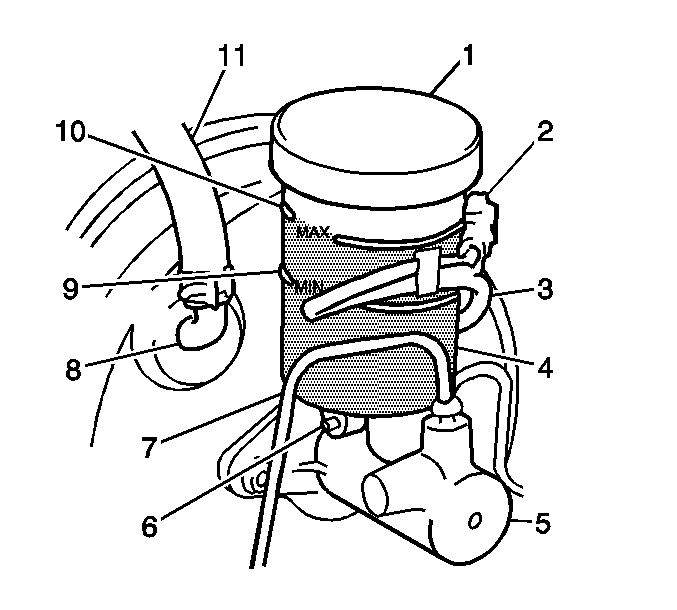
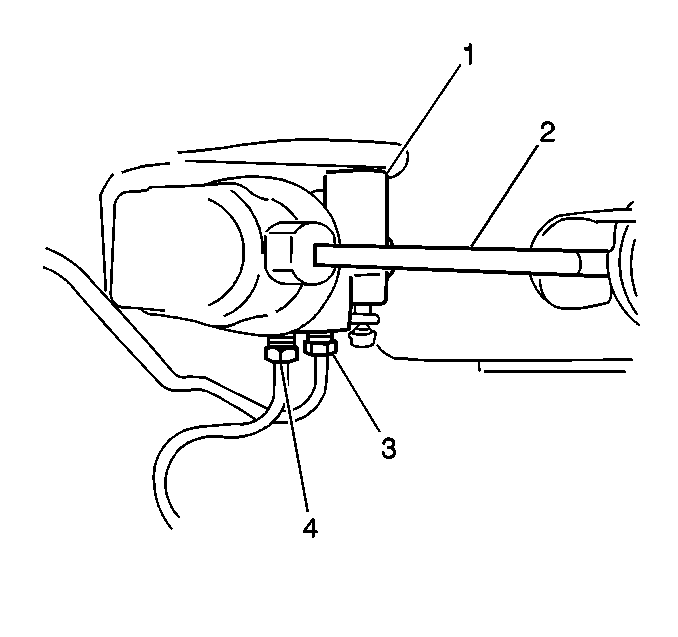
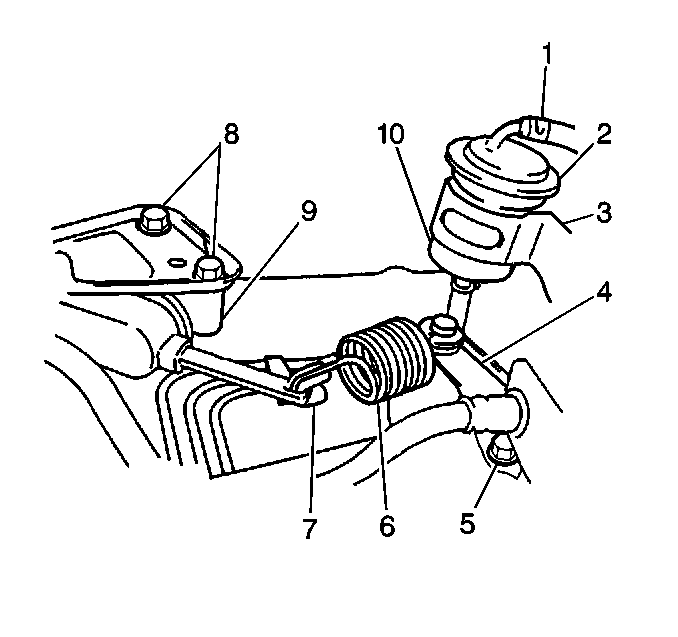
Installation Procedure
- Apply multi-purpose grease to the upper pivot point (1) and the lower pivot point (2) of the spring.
- Install the LSPV spring (6) and the LSPV stay (4) to the lever (7) of the LSPV assembly.
- Install the LSPV assembly to the vehicle body.
- Install the LSPV assembly bolts (8).
- Install the LSPV stay bolt (5).
- Install the brake pipes to the LSPV.
- Lower the vehicle.
- Fill the brake fluid reservoir. Refer to Master Cylinder Reservoir Filling .
- Bleed the air from the hydraulic brake system. Refer to Hydraulic Brake System Bleeding .
- Place the vehicle on a level floor.
- Verify the vehicle trim height is correct. Refer to Trim Height Inspection and to Trim Height Specifications in Suspension General Diagnosis.
- Push up the LSPV lever (1) with your finger until the lever stops. Measure the length of the coil spring (2).
- If necessary, adjust the spring by changing the position of the stay (4).
- Inspect the LSPV body and the brake pipe joints. Verify that these components are free from fluid leakage.
- Measure the brake pedal travel. Refer to Brake Pedal Travel .
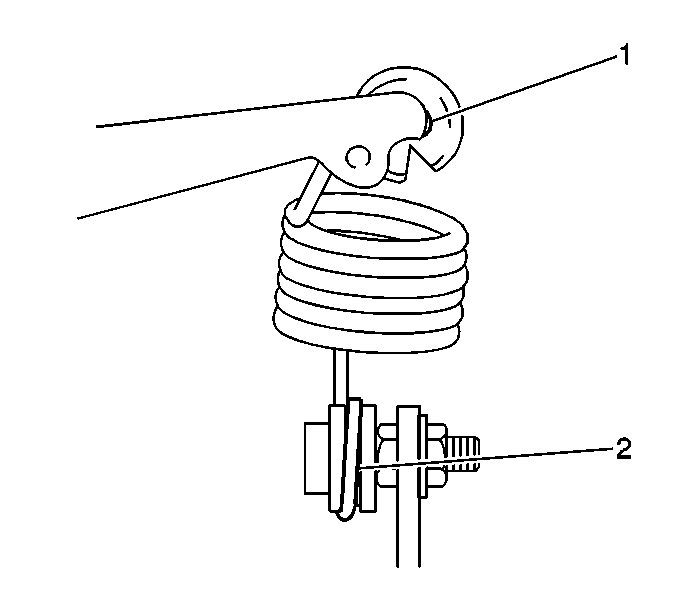

Notice: Use the correct fastener in the correct location. Replacement fasteners must be the correct part number for that application. Fasteners requiring replacement or fasteners requiring the use of thread locking compound or sealant are identified in the service procedure. Do not use paints, lubricants, or corrosion inhibitors on fasteners or fastener joint surfaces unless specified. These coatings affect fastener torque and joint clamping force and may damage the fastener. Use the correct tightening sequence and specifications when installing fasteners in order to avoid damage to parts and systems.
Tighten
Tighten the bolts to 23 N·m (17.0 lb ft).
Tighten
Tighten the bolt to 23 N·m (17.0 lb ft).

Tighten
| • | Tighten the brake pipe flare nuts (3,4) to 16 N·m (11.5 lb ft). |
| • | Tighten the bleeder plug to 7.5 N·m (66.4 lb in). |
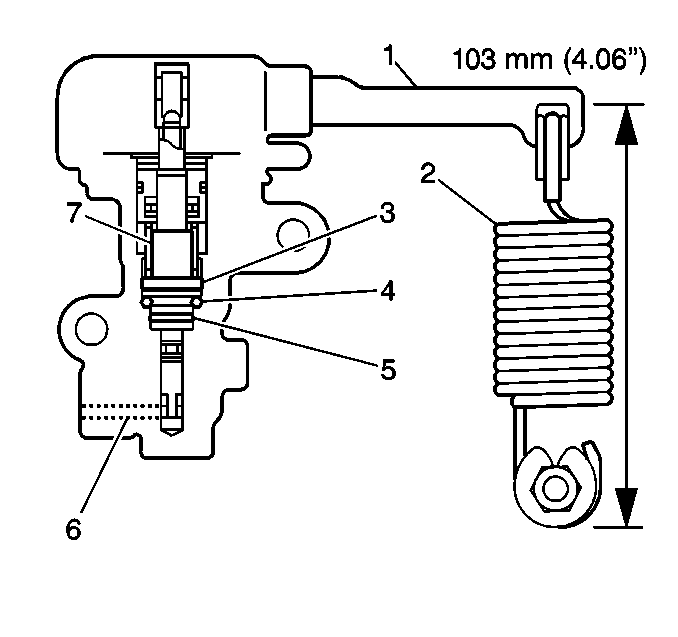
Measurement
The coil spring should measure 103 mm (4.06 in) between
the spring ends.

Tighten
Tighten the stay bolt to 23 N·m (17.0 lb ft).
